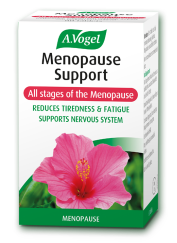Read the full video transcript below
Today's topic
Hello, and welcome to my weekly video blog, and today on A.Vogel Talks Menopause I'm going to be talking about stress.
The difference between stress and anxiety
Now, we often get stress and anxiety mixed up, but they are very different situations. And I know, you know, some women will say, "Oh, I get really stressed. These things are happening in my life," and other people are going, "I'm getting so anxious, and I feel really awful all the time." But the main big difference between stress and anxiety is that stress has a very real stressor.
There is something in our lives that's out there in our world that's causing us to be stressed, whereas anxiety is very often an unknown cause. There is nothing that we can pinpoint. We can be anxious for nothing, but for stress there is a real reason.
Common sources of stress
Now, especially at the moment, you know, especially when it's Christmas, when there's all sorts of things going on, we can be really busy. We've got family commitments. We've got to worry about what to buy people for presents. We've got things to organize. We've got to go shopping. And isn't it awful, you know, just trying to shop when the shops are really busy? That in itself can give you stress.
So if you feel that you are getting stressed at any time of the year, have a sit-down and think about what is going on in your life. What is it that is stressing you? If you can't think of anything, if there's nothing in particular that's making you more stressed than normal, if it's a constant feeling of worry, of not knowing what to do and not knowing what's going on, then it's more likely that you're suffering from anxiety, and I have actually done a blog about that so there'll be a little link to take you back to that if you want to have another look at it.
How does stress affect your body
Now, the problem with stress is that it stresses our nervous system, and remember or nervous system is already stressed by the changing hormones as we make our way up to and through the menopause.
So our poor nervous system is going to get an even bigger hit of stressors at any particular time when we've got a lot of things going on in our lives. And we know already that a stressed nervous system is going to cause symptoms such as flushes and hot sweats, you're going to get the palpitations, you're going to get headaches, you can get breathlessness, you can get dizzy, you can feel really awful.
And sometimes when it gets to a really high pitch state, you can start to feel sick or nauseous. And these are all menopause symptoms as well. So very often when we are in a period of stress, those kinds of menopause symptoms are going to be worse, because you're getting a double whammy of everything.
How to deal with stress?
So what can you do about this? How can you deal with stress? I'd like to say it's easy, but, you know, as with all things, you know, these are things that we have to work at.
If you're feeling stressed, as I mentioned before, sit down and try and think what it is that's stressing you. Is it family? Is it things going on in the family? Are you too busy? Are you not relaxing? Are you taking too much on? Are you feeling resentful about what people are asking you to do? Are you having problems at work? Are you finding things more difficult because you're fatigued or, you know, that you've got other menopausal symptoms that you've got to deal with as well?
So look at the situations that are causing this extra stress and see if there is some way that you can reduce them. I know it's not always possible. You know, we are women in the 21st century, and life can be very, very difficult, and we can't just turn around and fly away even though I think most of us would really jump at the chance to do that.
How to support your health during stressful times
So look at all the stressors in your life, try and deal with them if you can. If you can't, then there are other things that you can do, and it's many of the usual things that I normally talk about.
So look at supporting your nervous system, so this is going to be plenty of magnesium, get your B vitamins, look at some of the stress remedies, like Stress Relief Daytime. This is something you can take during the day that may help to take the edge off the stress for you.
Remember the slow, deep breathing. If we're in a panicky, stressful state, you very often find that your breathing starts to speed up, and this is where you can end up a little bit breathless if it gets too bad. So remember to practice the slow, deep breathing, and that can give you even just 30 seconds' worth of a little bit of calm, and that can help you to get yourself together.
Remember the water, it's really important as usual, because dehydration will stress our nervous system further, and if we're already getting the headaches and the hot flushes, then that will make everything worse as well.
And just remember to try and get a little bit of sleep, and I know, again, this is difficult if you're getting night sweats, you're not going to get the proper rest, and that can be a factor in your next day's level of stress and what you can cope with.
Remember to do a little bit of rest and relaxation every day if you can, because that's going to help the whole picture.
So very interesting state, stress. It affects us all, and I know that from all the things that those of you who have contacted me have said, it plays a huge part in the menopause. So anything we can do to help ourselves just to reduce that stress is going to be beneficial for all our menopause symptoms as well.
So hope you find that interesting, and I will look forward to seeing you next week for another A.Vogel Talks Menopause.









